The discussion in Session 2 of The Tokyo Conference 2020's Public Forum revolved around the upcoming US presidential election and what form the international order will take in the future.
International cooperation is the most effective way of maximizing national gain
To open the session and provide a topic for the upcoming discussion, The Genron NPO welcomed Takehiko Nakao, who served as President of the Asian Development Bank (ADB) until January of this year. Nakao began with a review of the current state of democracy.
"Globalization and advancement of technology move much faster than many people can absorb," Nakao began. "So, one of the problems is that the elites in countries can gain from this globalized world and the technologies, but often, factory workers, miners in the US and other countries - especially developed countries - are worse off at best."
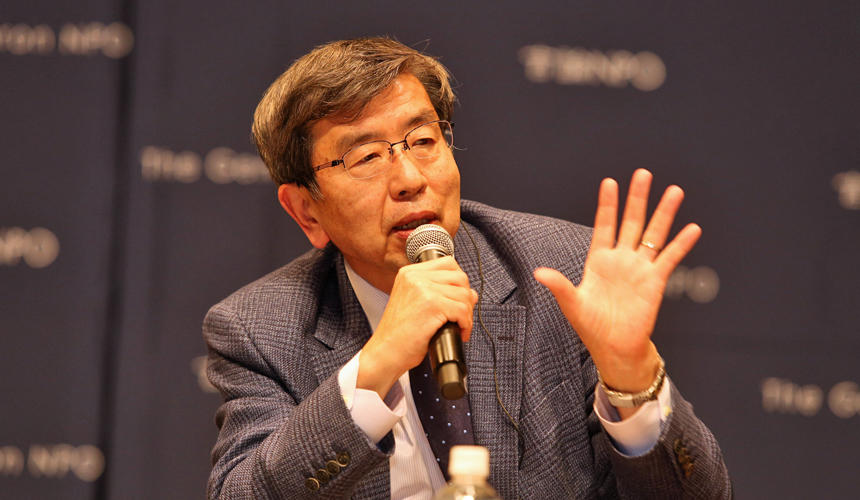
He referred to national sovereignty as one complication that must be faced, before pointing to the current weakness of the media and other fundamental elements of the democratic system.
"Generally speaking, because of social media and other things, the influence of intellectuals, professors, and media writers is weaker," he said. "This kind of community - the think tanks - should try to harder to keep its influence on intellectual, professional ideas."
Nakao next looked back at his experience at the ADB to touch upon the connection between globalization and sovereignty. "There are still many countries which are still developing, which still want to become stronger in terms of independence from the powers of the world," he explained. "There is a very strong sense of independence. India is no exception. Russia also has a strong feeling about that."
However, Nakao pointed to cross-border issues such as climate change, financial crises, and the current spread of COVID-19, all of which require international cooperation. He emphasized the need for international institutions to handle topics such as taxation, patents and intellectual property, and data. He then pointed out that Japan has put much effort into uniting the Asian community through such initiatives as the ADB, and emphasized the importance of a long-term outlook in such efforts, stating his belief that Japanese investments in the 1980s helped build the foundation of the modern global value chain in Asia.
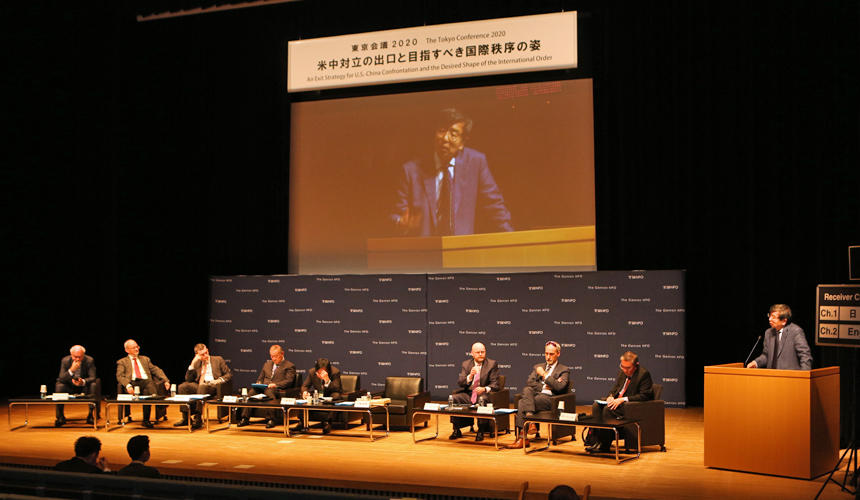
Finally, Nakao looked to the United States and China, noting that China still feels as if it has been overly influenced by other powers ever since the Opium Wars, so there needs to be some understanding for China's position.
"But they also want to play an important role in the global community in climate change, regional cooperation, and more," he said. "They have AIIV and the Belt and Road Initiative, and of course there are many issues, but (those efforts tell us that) China wants to be more influential and wants to be part of solving climate change and other issues."
Regarding the United States, Nakao suggested that the "America First" attitude being shown by the current administration is not problematic in itself, because every government must work to benefit the interest the electorate of a country, but noted that to maximize the benefits the people gain, international cooperation is needed.
Change unlikely whoever wins - Allies and friends should also make the effort
Next to offer his opinion for the discussion was James M. Lindsay, Senior Vice President at the Council on Foreign Relations (CFR) in the United States.
Lindsay broached the idea that what started the erosion of the US-led rule-based international order was - paradoxically - its success in bringing prosperity to so many countries and so many people.
"The order suggested that if people opened up their economies, they would prosper. That is exactly what happened. It unleashed globalization, which raised the standard of living in many countries. The problem is that globalization also unleashed a whole host of new problems that national governments and international organizations couldn't handle. I think climate change would be at the top of the list. At the same time, globalization dispersed economic and political power, making it harder to form solutions. That may be most obvious at the World Trade Organization, which is slightly over 25 years old, but it has struggled for the last two decades to make any progress on multilateral trade agreements," Lindsay explained.
Another reason behind the eroding international order is the ambivalence towards the order shown by many countries.
"Some countries, like Russia, have long resisted it, seeing it as antithetical to its interest," he said. "Others, and I think China stands out, have seen the order as primarily a means to grow their economy, and not something they had a fundamental commitment to, certainly in terms of its values and openness."
Moreover, diplomatic missteps on the part of the United States have also helped undermined the international community's trust. "Most recently I think the order has been stressed by President Trump," Lindsay stated. "That is really the thrust of 'America First' which argues that the international order that the United States championed after the end of World War II actually impoverished the United States. He called it 'an American carnage' in his inaugural address."
At the same time, Lindsay pointed out that while public opinion polls are showing that the American public are moving away from "America First," foreign policy will not be an important issue during the presidential election in the fall. "The outcome of US elections may have profound consequences for US foreign policy," he continued. "But Americans seldom vote on foreign policy. They vote on domestic issues."
Lindsay then raised a warning about the outcome of the election.
"However the 2020 US president election turns out, reinvigorating the existing world order is going to remain very difficult," he said. "It would be a mistake to assume that if a Democrat wins on December 3, that Washington will suddenly ride to the rescue of the international order." For that reason, Lindsay feels that both friends and allies of the United States should be encouraged to voluntarily put in more effort to work together with the United States.
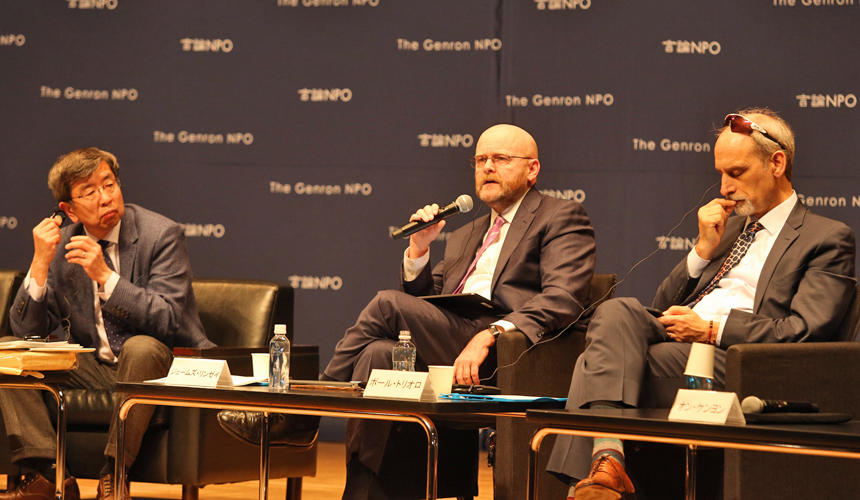
Finally, Lindsay wanted to address how the confrontation between the United States and China is currently being framed.
"I don't think most Americans see themselves as being in a confrontation with China," he said. "Rather, they see themselves as engaged in an effort to hold China to account. If China wants to participate in the benefits of this liberal, rules-based, American-led order, the Chinese have to live up to their commitments. I think Americans across the political spectrum would argue that China has, for at least a decade, deviated away from the course it pledged to in the early 2000s."
To revitalize the international liberal order, countries must become stronger internally - and think tanks have an important role to play
Robin Niblett is Director of Chatham House in the United Kingdom, and he provided a pre-recorded video address to the forum. Niblett began by pointing out that the world is home to a variety of different political systems, from liberal democracies to authoritarian governments, all working together to achieve common goals, and noted that "We have managed over the last 70 years to build a globalized economy around those different political systems."
Since we have those different systems working towards common interests, Niblett believes that it follows that "systems of accountable and inclusive governance are the bedrock of long-term international cooperation."
Niblett turned the topic towards the liberal order itself.
"The only way that the liberal part of the world is able to remain strong at this time of division is by making sure that we as liberal democratic countries are strong internally," he said. "Part of the problem we've had is that in the pursuit of globalization and by focusing on the global benefits, whether for our individual countries or for the world as a whole, we've ended creating divisions and schisms inside our own liberal democratic countries that are now putting them under huge pressure."
Niblett expressed some ideas on what needs to be done.
"There are many steps that need to be taken. This is to do with education, this is to do with infrastructure investment. But it is also to do with giving citizens a sense that change isn't going to happen too quickly; that change won't happen in a way that exacerbates the bad situation of the losers, while simply helping the winners. I would argue that liberal democratic countries need to think a little bit more about how they protect their societies from globalization, and not simply leave them in the mix."
One challenge arises from the United States and its zero-sum "America First" approach to international relations. Niblett described the zero-sum approach as being against the ideals of the liberal international order, but offered a suggestion on how to combat this.
"We are at the beginning of an intense strategic competition, and I don't think there's anything we can do about that," he said. "This is part of the reality of international affairs for the next ten years, maybe longer. The core element here in that competition is that the liberal world needs to be strong. It needs to stick to its values. To the best of our ability, we need to keep the west together in this process, and recognizing at the same time that our liberal system is the future. That because we are able to have a system of government that empowers individuals, that freedom is stronger than control. We need to just believe in, and protect that power in the long run. Let's be confident about our system, but let's not be paranoid. Let's be confident about it, let's protect it, let's defend it, let's promote it, but don't build walls in the process."
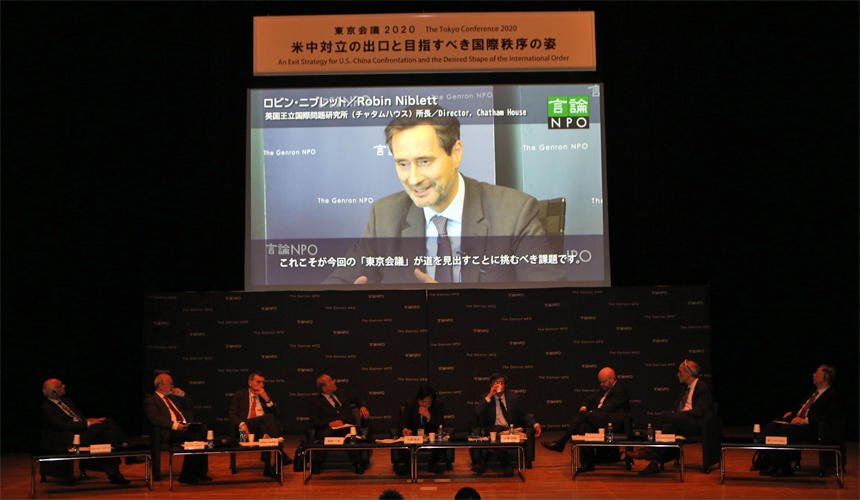
Niblett also praised the Tokyo Conference and highlighted what it provides.
"The Tokyo Conference is clearly an opportunity for us to remind ourselves as Western institutions of what we need to do to remain strong in this moment of great uncertainty and transition. As a group of institutions that are part of that civil society - part of that free information space that enables democracies to exist - we must commit to protect that separation of powers whenever we see our own governments forgetting that commitment and undermining some of those key aspects of what liberal democracies are all about. It is happening in democracies around the world, so we must stand up and fight against it."
With the themes for discussion presented thusly, the discussion began.
Better governance through a declaration on ethics
Rohinton Medhora is President of the Centre for International Governance in Canada), and he believes that in order to protect the liberal order, actors must continue to do what they are doing, but must be more explicit in how they do it. He also thinks that technological breakthroughs have left gaps in the government framework that need to be filled.
"Just as we have a Universal Declaration of Human Rights, we are now at a stage where we need something similar in the area of ethics and technology," Medhora said.
His reasoning for this is that even though the Universal Declaration of Human Rights (UDHR) is not legally binding, it has led to countries domestically incorporating the legal concepts laid out within. In a similar way, a declaration on ethics could lead to the establishment of more effective governance. Medhora also feels that discussions on data management and other issues are also needed here. The current situation does differ from situation in the world when the UDHR was developed, however.
"Unlike in 1944 and 1945 when you only had victors come together, now we're at the stage where we don't have winners or losers. And we have a forum in the G20 which is ready-made for countries which don't see eye to eye on everything, who meet regularly to talk about these things."
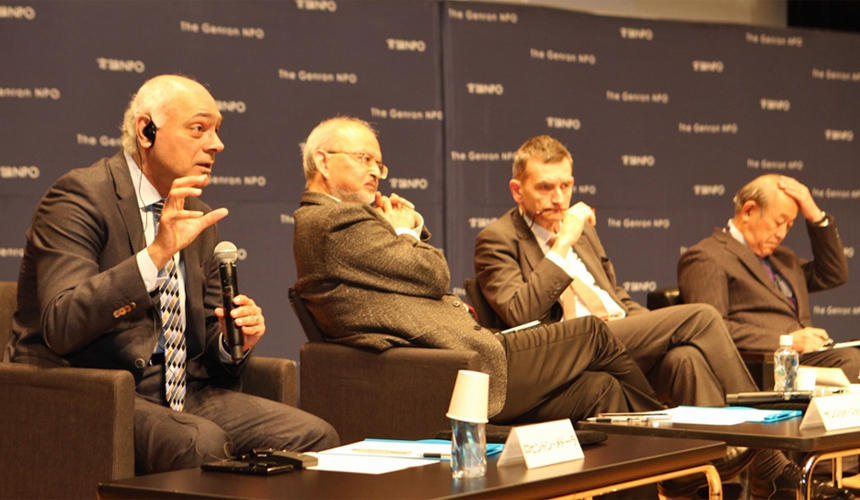
Later in the session, Paul S. Triolo, who serves as Practice Head of Geo-Technology at the Eurasia Group in the United States, also spoke about ethical principles regarding new technologies.
"A good example is AI," he said. "In the world now, we have a general agreement on AI ethics; everyone agrees that AI should be human-centric. But we're now trying to implement regulatory issues around AI. In Europe, you have a very nice public-private partnership of high-level experts that has drafted a very good set of recommendations. In the US, we have a different approach which is non-governmental organizations under the Partnership on AI, for example."
The approaches may be different, but both aim to inform policy-making, Triolo explained. That has led to an issue with China, however.
"Two years ago, the Partnership allowed Baidu to become a member, and this drew a huge response internally - because it's a very democratic organization - from human rights groups. But the general consensus is that since AI is a global project and because Chinese companies are such huge players, you want to bring the Chinese companies into the discussion around ethics and regulation."
Triolo noted that facial recognition and some its applications will the first AI areas that come under regulation in Europe, but added, "Then what does China do? Chinese companies are supporting the Chinese government in using facial recognition in ways to monitor populations and in ways that are viewed as inimicable with Western values."
With the bottom-up citizen-driven approach being utilized in Europe, Triolo believes that the issue lies in how to bring Chinese companies into the dialogue.
"At some point, there is going to be a need for a trilateral effort on this among the three big players," he said.
The private sector should also play a role
Sunjoy Joshi is Chairman of India's Observer Research Foundation (ORF) and he touched upon Lindsay's statement on US foreign policy, agreeing that US disengagement from the world began "long before Trump."
"It has been part of a process of disengagement once the US started counting the costs of engagement and found them to be disproportionate," he said. "But the problem was that every attempt to disengage itself only ended up pushing it deeper and deeper into the morass." What Trump has done differently, Joshi said, was that he tied American disengagement to "in your face unilateralism."
"Gone is the idea of building consensus. You don't need to build consensus to disengage. If it means throwing your Kurdish allies under the bus in Syria? So be it. If it means striking a deal with the Taliban in Afghanistan knowing very well that once the US troops withdraw is going to be back to business as usual..."
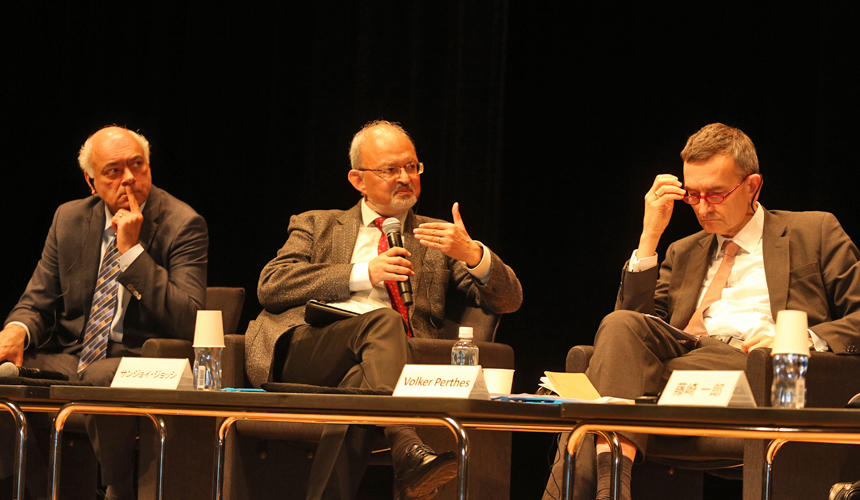
Nonetheless, there has been a price to pay."In the process, trust between allies has been a major casualty," he said, and expressed his doubts about whether or not that trust can be restored if a different person is elected to the presidency at the end of the year.
With little to be expected from the United States, Joshi believes the only way forward is for other countries to help themselves, and he also spoke about the role GAFA companies and companies in other countries should play.
"They all have cash in hand which is larger than the GDP of two thirds of the countries," he said. "So...today when you start talking about the new world order, it's not just the G20; you're going to have to start negotiating with a lot of other stakeholders in the process and that is going to be a challenge."
Lowering the hurdles to agreement while bringing more countries over to the liberal side
Executive Chairman and Director at the German Institute for International and Security Affairs (SWP) Volker Perthes stated that things will remain difficult whoever wins the next American election."There will be a new challenge for the Europeans and for Japan to step up their efforts and take more responsibility to either maintain what is left of the international order, or to reinvigorate it together with a new American president," Perthes said. "So let's prepare for that role and ask what kind of international role democracies want."
He believes that a "realistic multilateralism" should be the goal. "Differently put, I think that we in Europe and in Japan the United States should be very clear about our democratic and liberal values, but we should not expect that everybody else subscribes to these values in the foreseeable future."
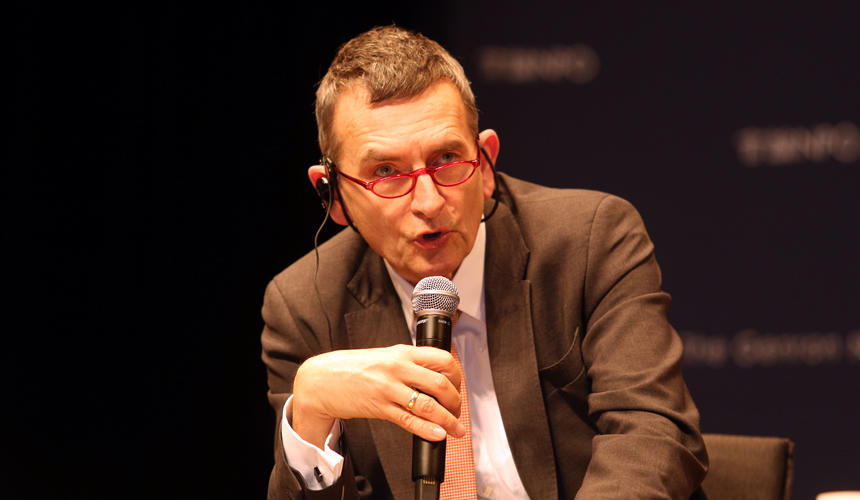
Moreover, Perthes feels that democracies need to challenge China's growing influence without undermining the cooperative framework built over the last few decades.
"While it is important to avoid one-sided dependencies, we shouldn't throw interdependency into the bin of history. Interdependency still has a stabilizing effect, and is potentially a peace-building force," he said. "There are many countries in Asia and Africa who appreciate China's economic outreach, the Belt and Road, and at the same time fear one-sided dependencies, and here it is upon richer countries like Japan and Europe to step in and offer alternatives."
Finally, Perthes brought up the current situation in Hong Kong, as he asserted that democracies should remain confident regarding any systemic rivalry. "We shouldn't lose sight of how attractive democracy, rule of law, and checks and balances still are, particularly in countries where they are absent," Perthes asserted. "If you ask yourself why the Chinese authorities are so nervous about Hong Kong, it is because democracy is still very much attractive, and we shouldn't lose sight of that."
Although, he warned that Democracies cannot simply rest on their laurels.
"When we engage internationally, we shouldn't leave vacuums," he argued. "We have seen that when the United States left the Human Rights Council. China stepped in and is very active in the Council, but it tries to redefine the very individualistic concept of human rights. We must not let that happen. We must not leave vacuums in international organizations like the Human Rights Council, like UNESCO, and others, but rather actively defend our democratic values where they are challenged."
Being more accommodating and accepting of diversity
Keng Yong Ong, Executive Deputy Chairman of the S. Rajaratnam School of International Studies in Singapore, expressed his agreement with those panelists who had spoken before him, but added that much is being given away in terms of time and opportunity to those ascribing "to issues of faith."
"Strong leaders rely on issues of faith and identity, and not on civilizational 'aspects,' to try to play a role in moving away from the liberal world order that we know, and this is very dangerous," Ong said. "In all our nations, in the structure of our respective countries, a lot depends on how we accommodate each other's beliefs and faiths, and our mutual understanding for the need for co-existence."
"In this respect," he continued. "In many of the smaller countries, an important and essential element of the existing world order as we know it, is how to accommodate each other with regard to what we believe in, how we see our respective faiths and beliefs. And is there a way to stop the extremists and the more cultural "civilizational dimension" from taking over? This is something that in some of the bigger nations, maybe like Japan, is not so well appreciated, because the majority of your people don't have to deal with this kind of potential conflict over beliefs, faith, and identity."
Ong believes that these aspects must also be accommodated in going forward with the liberal world order, lest we "lose sight of the other traits of our respective societies."
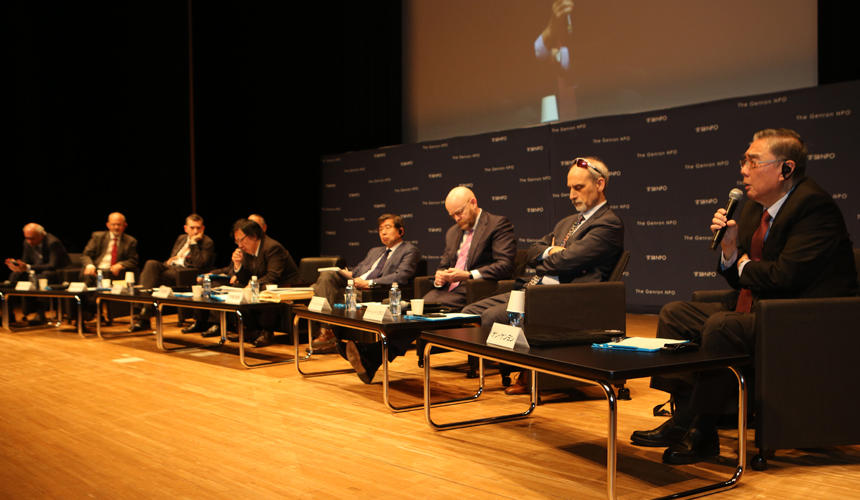
Building a strategy that allows for potential change in both the United States and China
Former Japanese Ambassador to the United States Ichiro Fujisaki is President of The America-Japan Society, and he followed Ong's comments by pointing out Trump's criticism of the WTO handling China - which is already a superpower - as only a developing country, and in doing so, giving it preferential treatment. Fujisaki believes that Trump's objection to such rules that do not fit the status quo should be see to a certain extent as a raising of the alarm.
When Kudo took the mic again, he questioned the assertion that "the whole world feels the US-China conflict will continue into the future," suggesting that there is the potential for change in both countries. In the case of the United States, it may only be taking the hardline because it is in the middle of an election, and Kudo reminded the panelists that, "it has often been the case that diplomatic policies have changed completely when a new president takes office."
Regarding China, Kudo pointed out that hints of unrest can be seen in the authoritarian regime's response to the outbreak of COVID-19 and to the demonstrations in Hong Kong. If these two countries can change, Kudo believes it is the responsibility of Japan and other countries to keep that potential for change in mind when coming up with strategies for the future. Towards the end of the session, Kudo asked the first speakers to provide their thoughts on the discussions thus far.
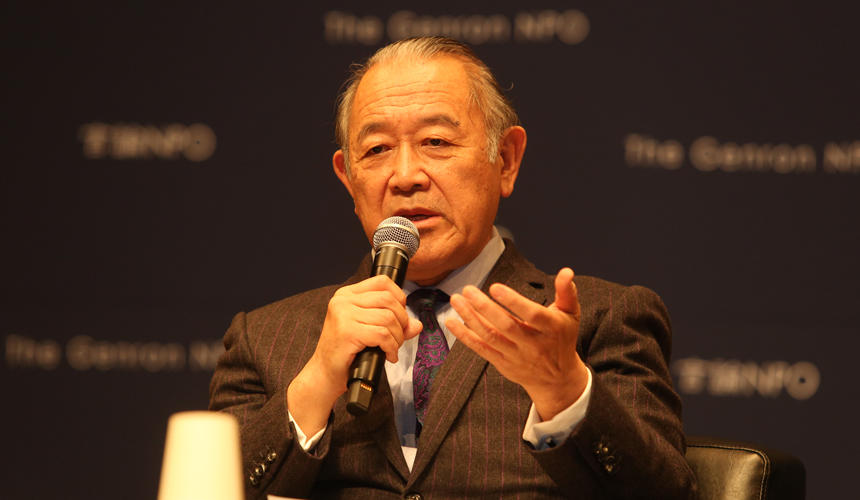
Lindsay felt that "a lot of really smart things" had been said during the Tokyo Conference, but returned to a point made by Niblett in his video, in which he asserted that the US-China strategic competition is likely to last for some time.
"To talk about a landing zone or exit to that is to misunderstand the nature of the competition," he said. "However, I think it's important to understand that the United States' response is going to be a mixture of engagement and contestation. And I think it needs to be."
Lindsay added that there is a lot of opportunity for finding common ground, meaning that multiple landing zones and exits can be found. Simultaneously, liberal democracies must be guided by the recognition that some things cannot be negotiated away, and brought up an example of how the attitudes of China may be "antithetical" to the core values of the liberal democracy.
"A couple of months ago, the General Manager of the Houston Rockets (a team in the National Basketball Association in the United States) sent out a single tweet supportive of Hong Kong, and that led the Chinese government to crack down and basically apply very overt pressure on the NBA," Lindsay said. "This example has been multiplied a number of times over, and this is a significant threat. This is something that we have to recognize and deal with."
Nakao spoke next, pointing to the dichotomy between the liberal political order and authoritarianism, and suggesting that more thought needs to be put into why countries become more authoritarian. He added that China has also benefited from the existing order, so they too want to be part of the international order, but efforts must be made to ensure that smaller countries in Asia and Africa do not implement or keep authoritarian regimes.
In addition, Nakao stated that the liberal order is losing strength partly because, "There is a strong feeling of resentment and disappointment about globalization" and the issues it has caused. Nakao believes it essential that the US step back into a leadership position, and said that he will continue to advocate for this, as "it is also in the interests of the US."
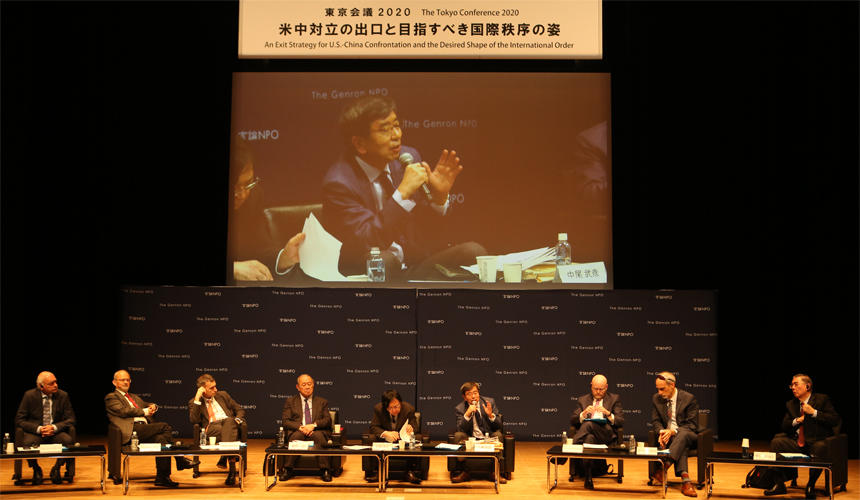
After a question-and-answer session with the audience, Kudo provided a recap of the day's sessions, stating that the discussions had raised a number of issues of great significance to the world. He also announced that the following day would see the release of the Statement to the Group of Seven Summit in the United States, and expressed his strong desire to present it to the United States, the host's for this year's G7.
Fujisaki stood to give the closing address, expressing his respects and gratitude to the panelists and audience members from different countries who attended the forum despite the risks posed by the spread of COVID-19, and thereby brought the proceedings of the first day of The Tokyo Conference 2020 to a close.
Read more:
Formulating an exit strategy for the US-China conflict and launching a new era in US-China co-existence
VIDEO: Tokyo Conference 2020 "How should we join hands in repairing the global liberal order and democracy"
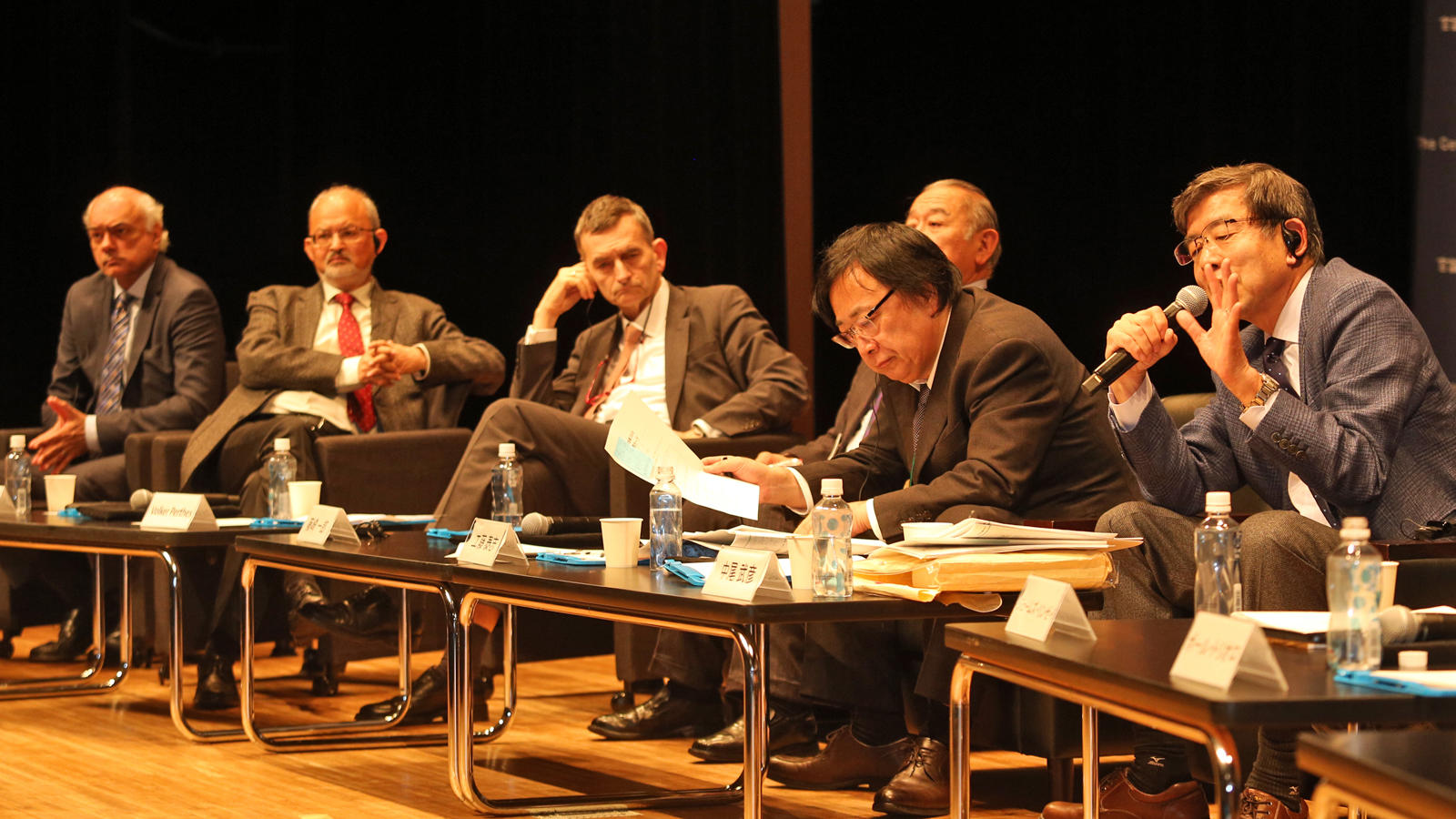
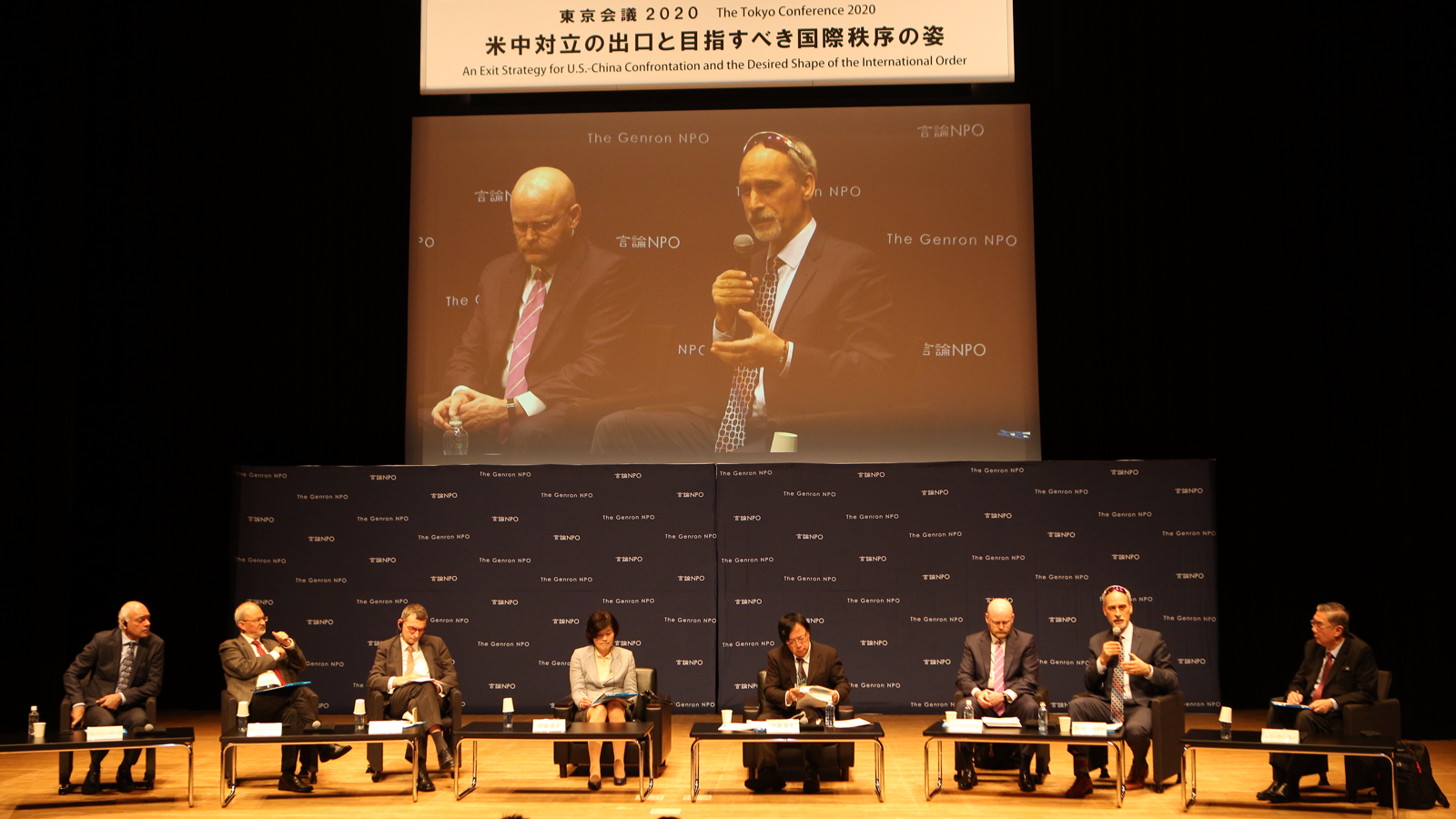
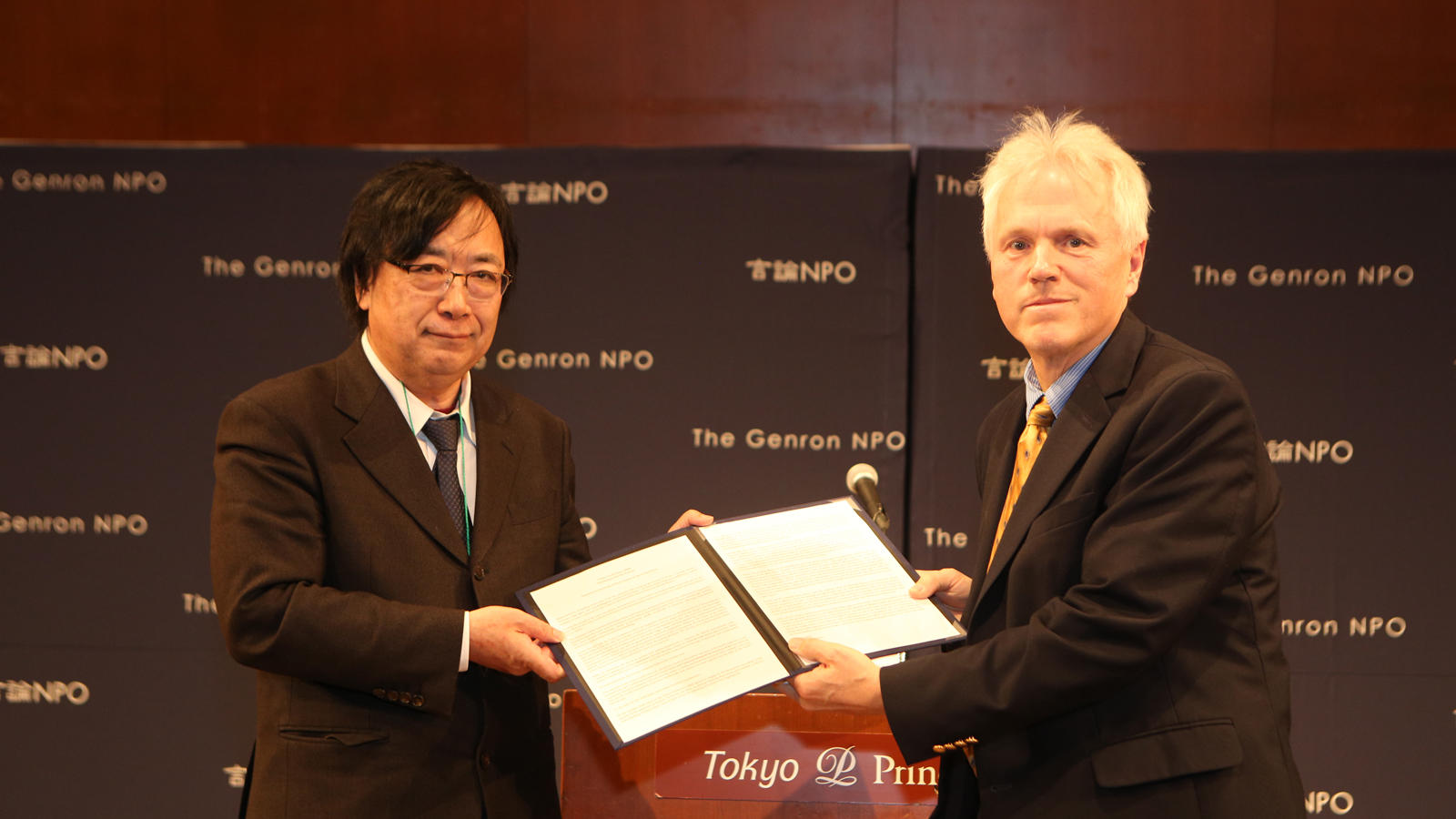
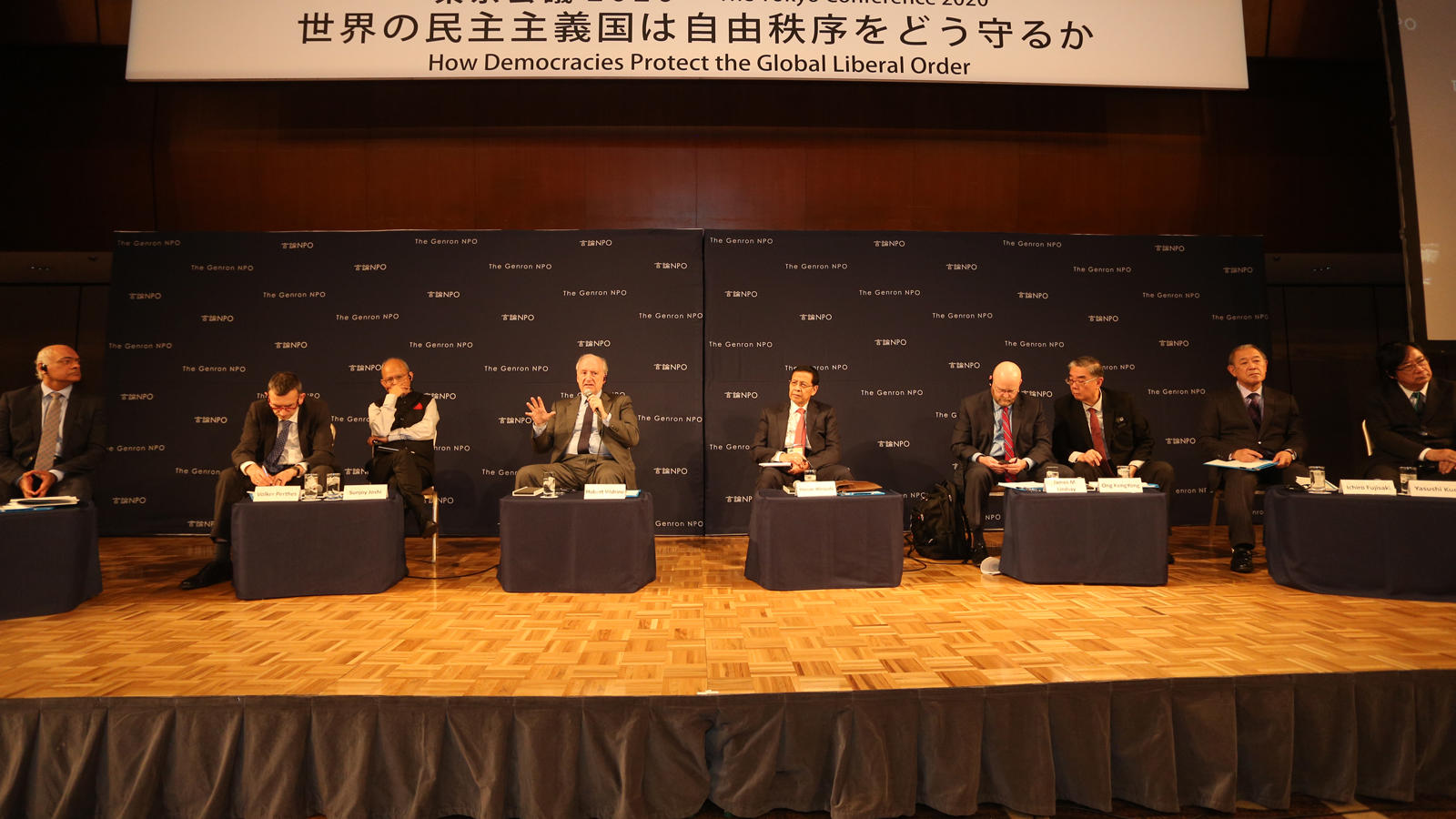
Post a comment